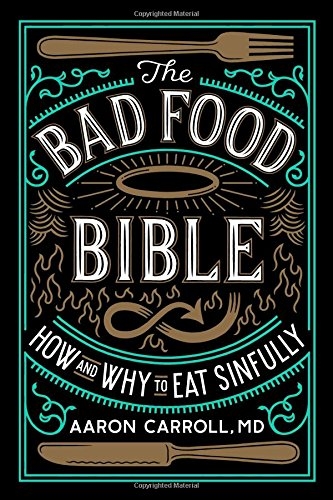A new book by MD Aaron Carroll suggests that all the ‘news’ and research about whether foods are good or bad for you is a load of, well, excess fibre. Carroll says that a lot of research on diet and food is based on animals and the results are vague at best. Evidence that certain foods are bad is ‘very weak’…
 I disagree. Not entirely, but in the main.
I disagree. Not entirely, but in the main.
Carroll told U.S. National Public Radio, “All the data that’s behind making you think these foods are bad for you, is pretty weak. … [I]f you just take some sensible ideas and try to eat in moderation, and not worry about it too much, you’ll probably be much healthier and certainly much happier.”
That, I agree with. And Carroll also has definite opinions about the unhealthiness of ‘processed’ foods: Stay away from it! That I agree with, too. It may be cheap and satisfying, but usually not a great source of essential nutrients.
I also agree with Carroll’s opinion on moderation. But, at the same time, I remain a firm believer in Julia Child’s motto: “All things in moderation, including moderation!”
I also agree with Carroll that Salt isn’t poison, Red Meat isn’t going to kill me outright, and that Wine is an essential part of every supper. And some luncheons.
One stand on which I disagree with Carroll sharply…
What I cannot accept is Carroll’s wholesale dismissal of medical, dietary and food research as “very weak”. I am particularly surprised that he would ignore the flood of recent research studies that data-mine and reverse-engineer huge population surveys on diet and eating habits – studies which have yielded such findings as: Nuts really are good for your cardio health. Gluten Sensitivity is different from Gluten Allergy. Mushrooms help fight aging. And that’s just the beginning.
Wile Carroll’s comments focus on science that concludes certain foods are bad for you, rather than on the science that shows certain foods are good for you. But I am very wary of the subtle smear his stand on ‘science’ makes on all research, rather than just that which tends to demonize ‘bad foods’.
On the whole…
I have to observe that Carroll does hedge his best on the whole issue by standing on a foundation of moderation. But I do think his claim that we’d all be better off if we just do what feels right, dietarily, we’ll, “probably be much healthier and certainly much happier.” Any kind of blanket recommendation or condemnation from an authority such as an MD always makes me suspicious about the overall quality of the advice.
Carroll’s book is fun to read and his phrasings and logic seem compelling. But – as I I’ve emphasized – I can’t agree with his basic positions on science and research. It’s a provocative read and it’s available on Amazon now.
~ Maggie J.
